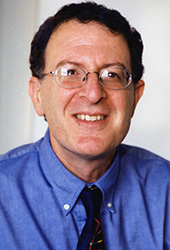Washington University’s Jeffrey I. Gordon, MD, has been elected to the American Philosophical Society. He is the Dr. Robert J. Glaser Distinguished University Professor and director of the Center for Genome Sciences and Systems Biology at the School of Medicine.
Gordon is known widely for his pioneering studies
demonstrating how the tens of trillions of microbes that live in the gut
influence human health. He was among 33 members elected this year to the society, which was founded in 1743 by Benjamin Franklin for the purpose of “promoting useful knowledge.”

As a member, Gordon joins the company of U.S. presidents, Supreme Court justices, and prominent scholars from a variety of disciplines including writers, artists, historians, economists and scientists.
At Washington University, members of the philosophical society include Chancellor Mark S. Wrighton; anthropologist Patty Jo Watson, PhD, the Edward Mallinckrodt Distinguished University Professor Emeritus of Anthropology; and Peter H. Raven, PhD, the George Engelmann Professor Emeritus of Botany and President Emeritus of the Missouri Botanical Garden.
The society’s activities reflect Franklin’s spirit of inquiry and provide a forum for the free exchange of ideas. They also convey the conviction of members that intellectual inquiry and critical thought are inherently in the public interest.
Gordon’s research has uncovered links between dysfunctional gut microbial communities and two global health problems: obesity in Westernized countries and childhood malnutrition in poverty-stricken regions of the world.
By transplanting communities of gut microbes from people who are healthy, obese or malnourished into mice born and raised in sterile conditions, Gordon and his students have characterized how those microbes, in combination with various foods and diets, influence many of our biological features.
Gordon’s studies have shown that the nutritional value and metabolic effects of the foods people consume are connected intimately to the workings of their gut microbial communities. This knowledge is important for preventing and treating childhood malnutrition and obesity and for creating diets of the future.
Such diets have the potential to improve nutrition and health at various stages of people’s lives in different cultural and economic contexts. The latter is a pressing 21st century problem, given the dramatic growth in the human population, the challenges posed by transitioning to sustainable agriculture, and the dramatic changes in food preferences brought about by globalization.
Gordon earned his bachelor’s degree from Oberlin College. He received his medical degree from the University of Chicago, from which he will receive an honorary Doctor of Science degree during its June commencement.
He joined the School of Medicine faculty in 1981 and has spent his entire career at the university. A champion of interdisciplinary education, he has mentored 120 PhD and MD/PhD students and postdoctoral fellows in his laboratory.
Gordon is a member of the National Academy of Sciences, the American Academy of Arts and Sciences, and the Institute of Medicine of the National Academies. In 2013, Gordon received the Selman A. Waksman Award in Microbiology from the National Academy of Sciences and the Robert Koch Award from the Koch Foundation. In 2014, he received the Passano Laureate Award from the Passano Foundation, in recognition of his central role in establishing the field of human microbiome research.
Washington University School of Medicine’s 2,100 employed and volunteer faculty physicians also are the medical staff of Barnes-Jewish and St. Louis Children’s hospitals. The School of Medicine is one of the leading medical research, teaching and patient-care institutions in the nation, currently ranked sixth in the nation by U.S. News & World Report. Through its affiliations with Barnes-Jewish and St. Louis Children’s hospitals, the School of Medicine is linked to BJC HealthCare.